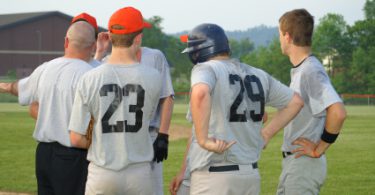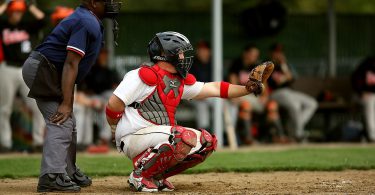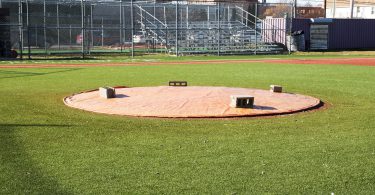This article is not an attempt to say that size and physicality are not important in recruiting. They are, as we clearly explain here and show with our discussion on the importance of strength and conditioning. Instead, this article is an attempt to show that talent rules all and size doesn’t have to be an obstacle to playing at the next level.
“I’m too small to play college baseball.”
“Only the biggest dudes get to play in the pros.”
“College coaches only look at the strongest, most prototypical looking bodies for projectability at the next level.”
These ideas are all too common at the high school level. Players often oversimplify how coaches evaluate players, worry too much about things that are out of their control, and forget that ability is a great trump card for size. As you pursue college baseball, it’s vitally important to remain optimistic and confident in your abilities – particularly what YOU bring to a college program.
Let’s do a brief experiment. Take a look at the MLB stats leader boards at the time of writing this. You’ll notice a few interesting bits of information about the makeup of the leaders who sit atop some important categories.
For example, let’s look at some players who currently compose the top 5 in several offensive categories and their physical makeup:
- Tim Anderson – 6’1”, 185 lb (AVG)
- Whit Merrifield – 6’0”, 195 lb (HITS)
- Nick Castellanos – 6’4”, 204 lb (2B)
- Pete Alonso – 6’3”, 235 lb (HR)
- Alex Bregman – 6’0”, 180 lb (BASE ON BALLS)
- Mallex Smith – 5’10”, 180 lb (STOLEN BASES)
What do these players have in common, exactly? Height? Weight? There’s obviously some overlap, but it’s probably not what you’d expect. They do indeed have several things in common, but they can’t easily be seen or measured – they are: hard work, persistence and talent.
Last year’s best were an even better example. Just take 2018 AL MVP, Mookie Betts, standing all of 5 foot 9 and 180 lbs soaking wet. It’s likely he was told time and again that he was too small to succeed at (insert any next level of baseball he wanted to play at). Thanks to his hard work, persistence, and skill, he’s now on a fast track to Cooperstown.
We’re not trying to argue that physicality isn’t important or that some coaches don’t intentionally recruit bigger players. What we’re saying is that there are quality players at every level of all shapes and sizes. Rather than worry about what you can’t control (your natural size), it’s more important to focus on making the most of what you do have with a quality strength and conditioning program. Every recruit can work on getting stronger and improving their skill set. If you don’t have standout size or a big time tool, we discuss ways you can still get recruited and succeed in college here.
If you don’t have a “prototypical” baseball body type and you’re still not convinced that you can keep playing baseball at the next level, let’s take a look at some top pitchers from 2019 as well:
- Kirby Yates – 5’10”, 210 lb (SAVES)
- Justin Verlander – 6’5”, 225 lb (WHIP)
- Hyun-Jin Ryu – 6’3″, 255 (ERA)
- Gerritt Cole – 6’4”, 225 lb (K/9)
- Jordan Hicks – 6’2”, 185 lb (AVG FB Velocity)
- Alex Claudio – 6’3”, 180 lb (GAMES PITCHED)
While the pitching leaderboard doesn’t currently have the same diversity of size as the hitters, there’s still a significant range in height (6 inches) and weight (75 lbs). This is quite the range and certainly provide plenty of room for different body types.
We’re not here to convince you that there’s any particular advantage to having an ‘atypical’ physical makeup – but in the game of baseball, hard work, persistence and talent far exceed physical measurements. Just look at 2017 year’s AL MVP race, which came down to eventual MVP Jose Altuve (5’6″, 165 lbs) and Aaron Judge (6’7″, 270 lbs). It’s not their size that’s getting them the accolades, it’s their production.
Unlike football or basketball where physical size can be a significant barrier to entry for upper levels of competition, baseball tends to be much more meritocratic. If you possess the talent and put in the requisite effort, your physical size shouldn’t keep you from where you want to go. Add this to the long list of reasons why we all love the game as much as we do and why you should plan to keep playing baseball.







